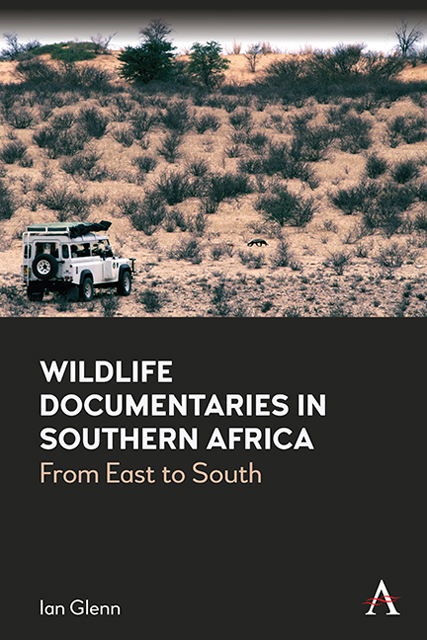Book contents
- Frontmatter
- Dedication
- Contents
- List of Figures
- Acknowledgements
- Introduction
- Chapter 1 What do the Critics Say?
- Chapter 2 A Theoretical Coalition?
- Chapter 3 Gone South: From East to Southern Africa
- Chapter 4 Private Lodges, Infrastructures and Guides
- Chapter 5 Going South: The Results
- Chapter 6 The Early History
- Chapter 7 The South Africans Enter the Game
- Chapter 8 Michael Rosenberg and Partridge Films
- Chapter 9 David and Carol Hughes
- Chapter 10 The Bartletts in the Namib, the Liversedges in Botswana
- Chapter 11 John Varty, Elmon Mhlongo and Londolozi
- Chapter 12 Richard Goss and Kim Wolhuter
- Chapter 13 Dereck and Beverly Joubert
- Chapter 14 Other Major Contributors
- Chapter 15 Going Live: Africam And Wildearth
- Chapter 16 Craig and Damon Foster
- Chapter 17 Must Love Animals?
- Chapter 18 The Social Turn
- Chapter 19 The Future of the Genre
- Chapter 20 The Influence of the Genre
- Conclusion
- Filmography
- Plates
- References
- Index
Chapter 18 - The Social Turn
Published online by Cambridge University Press: 10 January 2023
- Frontmatter
- Dedication
- Contents
- List of Figures
- Acknowledgements
- Introduction
- Chapter 1 What do the Critics Say?
- Chapter 2 A Theoretical Coalition?
- Chapter 3 Gone South: From East to Southern Africa
- Chapter 4 Private Lodges, Infrastructures and Guides
- Chapter 5 Going South: The Results
- Chapter 6 The Early History
- Chapter 7 The South Africans Enter the Game
- Chapter 8 Michael Rosenberg and Partridge Films
- Chapter 9 David and Carol Hughes
- Chapter 10 The Bartletts in the Namib, the Liversedges in Botswana
- Chapter 11 John Varty, Elmon Mhlongo and Londolozi
- Chapter 12 Richard Goss and Kim Wolhuter
- Chapter 13 Dereck and Beverly Joubert
- Chapter 14 Other Major Contributors
- Chapter 15 Going Live: Africam And Wildearth
- Chapter 16 Craig and Damon Foster
- Chapter 17 Must Love Animals?
- Chapter 18 The Social Turn
- Chapter 19 The Future of the Genre
- Chapter 20 The Influence of the Genre
- Conclusion
- Filmography
- Plates
- References
- Index
Summary
Introduction
In moving away from the BBC NHU blue-chip aesthetic, these filmmakers not only moved to a stronger connection with animals but also to a stronger consideration of social elements. Instead of the relationship Monbiot posited of the pristine nature portrayed in wildlife documentaries justifying the creation of parks and wildlife reserves (Monbiot 2002, 2018), most of these filmmakers highlighted social dangers to animals and their habitats or the tensions between wildlife and human development.
Conservation and Wildlife Film
As earlier chapters showed, the Wild Kingdom episodes regularly stressed the problems of animals like cheetahs and leopards being hunted for their skins and discouraged the use of their fur. They also regularly echoed the World Wildlife Fund’s concerns about endangered species. The Survival filmmakers showed the dangers of disease or the need to re-locate threatened animals. In South Africa, Van der Post talked of the toll white hunters had taken but praised conservation efforts, as did Norma Foster, who gave a far more detailed account and justification of the conservation work of wildlife authorities.
In the late 1980s, several films examined the dangers the African environment faced and the pressure human developments were placing on the environment. The most extreme, almost philosophical, version of this was in the Hugheses’ feature film The Missing Link (1988) which showed the fate of the last member of a rival hominid race, presumably with his group eliminated by homo sapiens. This film thus arguably became a way for the Hugheses to warn of the dangers modern man poses to the environment and fellow creatures.
The most extended and explicit treatment of the pressures modern African man was placing on the environment came in a film by investigative journalist Rick Lomba. His End of Eden (1986) looked harshly at almost all the agents of environmental degradation in Southern Africa and across Africa more generally. In his analysis of the problems the more arid regions of South Africa faced (and that probably appeared even more acute after a series of droughts in the 1980s), he attacked a range of actors he saw as responsible. The first to blame were the white settlers, as he claimed that fewer than 1 per cent of wild animals remained 150 years after white settlers came.
- Type
- Chapter
- Information
- Wildlife Documentaries in Southern AfricaFrom East to South, pp. 223 - 228Publisher: Anthem PressPrint publication year: 2022

